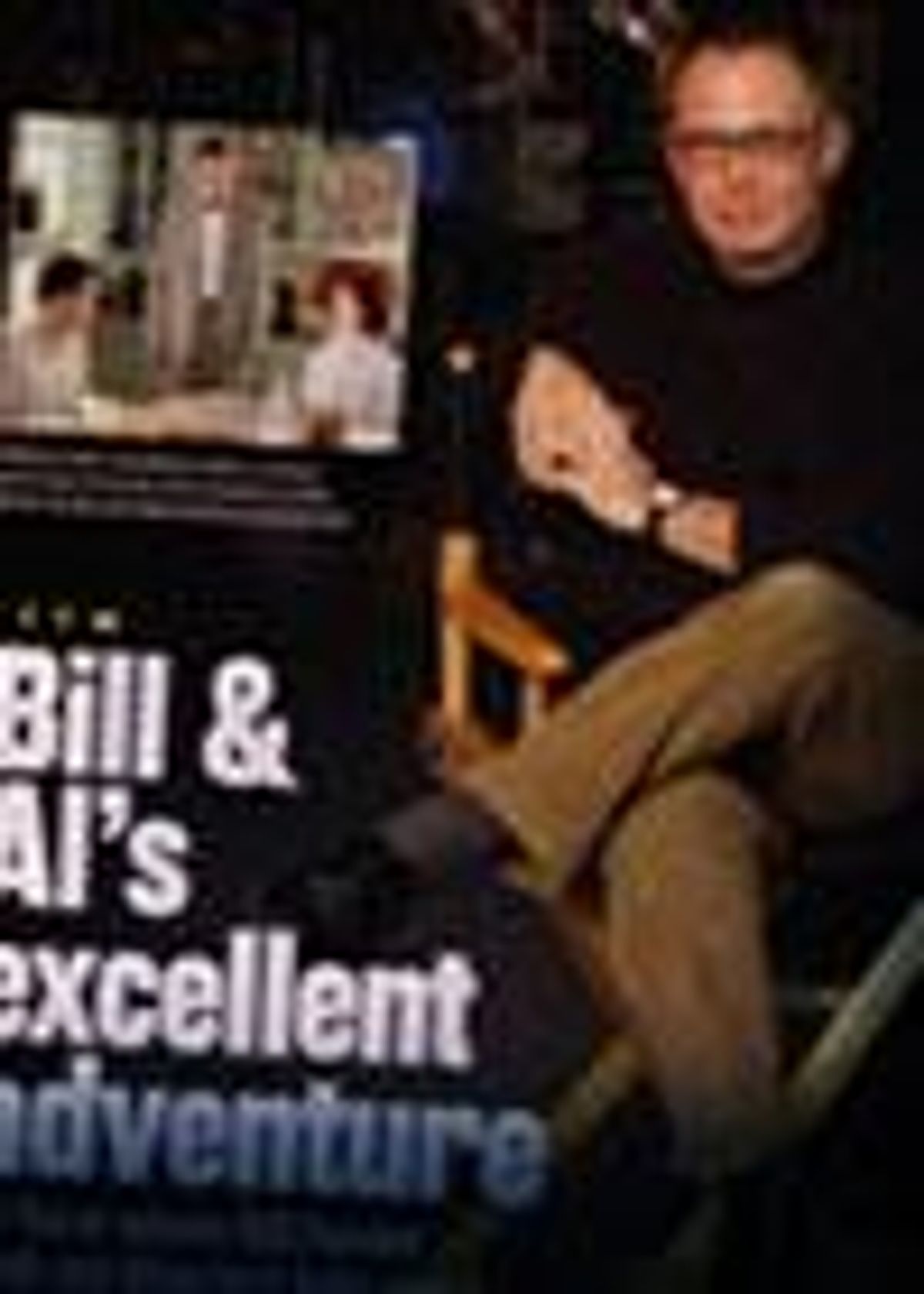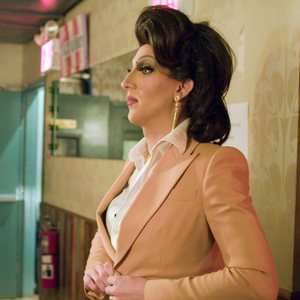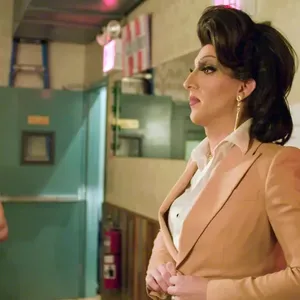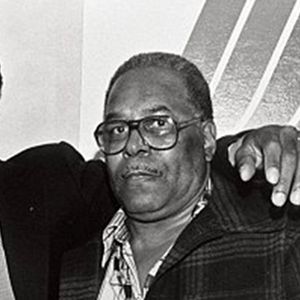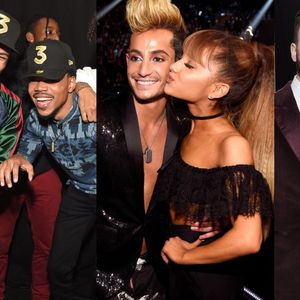These days, gay people most often invoke mid-century sex researcher Alfred Kinsey as source for the estimate that 10% of adults are gay (an oversimplification of one of his many findings) and for the Kinsey scale, grading sexual behavior from 0 (exclusively heterosexual) to 6 (totally gay). Few know much about the Indiana U. professor himself: how he clashed with his evangelical father, how his fascination with gall wasps evolved into a revolutionary research project on human sexuality, and how his 35-year marriage to a former student survived his (only recently revealed) extramarital homosexual liaisons.The acclaimed new film Kinsey, from out writer-director Bill Condon, brings Kinsey the man vividly to life. Starring Liam Neeson and Laura Linney--with a showstopping cameo by Lynn Redgrave, as a lesbian--the movie is like nothing you'll ever see on the Biography Channel: deeply emotional, sexually frank, and as current as November's election results.At Kinsey's core, Condon says, is a "tremendous fight" between people who want to talk about sex, particularly to protect the young from sexually transmitted diseases, and their powerful enemies "who think that the only answer is abstinence." It's a battle only too familiar to citizens of Bush America, and it first coalesced around Kinsey's comprehensive 1948 study of American men's sexuality--straight and gay. As Condon puts it, a lot of gay men must have put down Kinsey's book Sexual Behavior in the Human Male and said, "God, there are a lot of us--what are we going to do about it?""The two great social earthquakes of the last 50 years have been the women's movement and the gay movement," says the happily partnered Condon, who won a screenplay Oscar for Gods and Monsters and a nomination for Chicago. "Kinsey is in some way responsible for both."The Advocate: Tell me a little about how you chose to integrate Kinsey's bisexuality into your screenplay.Condon: Well, it was very important for me as a gay filmmaker that Kinsey not be a movie that could be typed exclusively as a gay film. At the same time, he is truly one of the fathers of the gay movement. There is no question about that. But because he didn't believe in labels and because he spoke to everybody, I didn't want it to dominate. It was very important to me to deal with his effect on women and men at the same time. In the movie, it takes this form of a real mirroring effect. You'd probably have to see the movie a couple of times to notice this, but the first time Laura Linney appears, she's got a crush on her teacher, and the first time Peter Sarsgaard appears, he has a crush on his teacher. It's the same shots, basically--he's looking adoringly at Kinsey, and you can see that this thing is going to happen. And for Kinsey, the anxiety he feels at losing his virginity at the late age of 27 is kind of mirrored by a second [loss of virginity, this time with a man]. He experienced gay sex for the first time in his 40s. It's not known for sure exactly when; it could be during his trips to Chicago when he was introduced to this homosexual subculture.As you depict in the movie, he was in Chicago with a colleague, collecting sexual histories from gay men.That's right. He was overwhelmed by how much activity there was. He also went to tearooms and parks, and there's some sense that those were his first [gay] sexual encounters. But his first full-on homosexual love affair was with Clyde Martin [the colleague played in the film by Peter Sarsgaard]. Again, you make these elisions when you're telling a whole story, a whole life, in two hours. There are huge things that you have to leave out. None of them [were] about the controversial stuff, in my mind, but--for example--[we don't deal with the fact] that Kinsey and his wife had a son who died as a child; a traumatic event for them, but it didn't seem pertinent to the story I was telling. Also, Kinsey had what you'd call a kind of Lorena Hickok--a very strong romantic friendship with a fellow scientist in his 30s, and they would take trips together with their families. There's no evidence that they acted on it sexually at all, so dramatically, all that [emotional energy in the film] gets sort of tied up in this relationship with Clyde Martin.I think it's going to be interesting to see gay people's reaction to the movie, because before they go, they may hear that Kinsey had homosexual experiences with one of his assistants who was gay, but they could come out of the movie saying, "Well, there aren't any gay people in this movie--there's just these two guys who sleep together a couple of times."Right. Yeah, but there are other gay people. There's Lynn Redgrave at the end, and also, there's a lot of those young queens that he interviews at the gay bar.You'll have to tell me about all the cameos that are in that scene.In that bar, it's Lypsinka--John Epperson--and Jefferson Mays, who just won the Tony this year for I Am My Own Wife. They're the two nelly queens that Kinsey first [approaches].Was it known at the time that Kinsey had had homosexual experiences?Not at all. He carefully cultivated this image of the conservative family man. He was, at the same time, surprisingly reckless with certain behavior. He got involved with one of the more well-known gay couples of the period, Glenway Wescott and Monroe Wheeler. Wescott was a famous gossip, so New York gay circles all knew what Kinsey was up to. The irony is, Kinsey was trying to open up the discussion and tell the truth about what everyone was doing but was very careful not to tell the truth about himself.So at what point does that enter the discussion?Only in the past 10 years [in real life]. [His colleague] Paul Gebhard--whom I've met and is a great, fascinating guy [played in the film by Timothy Hutton]--decided it was something important to talk about. Once he opened up, everybody else followed. Kinsey's children are in their 80s now and didn't know anything about it. Imagine finding this out about your parents when you're already in your 70s! They're still kind of in shock about it and resist the idea in some ways, but it's a tribute to the kind of parents they were.Kinsey and his wife could sit around the dinner table, as they do in one scene in your film, talking about their children's sexual development--and yet keep their own extramarital affairs to themselves.Right.Will Kinsey's children see the movie?They actually have. The daughters have and liked it, so I was pleased with that. It's a tribute to the kind of parents they were, knowing that even though they were very open about certain things, this was something they didn't want to expose their children to.Since Gods and Monsters you've had a number of other projects that floated around--how did Kinsey become the one that came to fruition?Well, that's a good question--I don't really know. It's just the one that got made first. But yes, I have a couple of others. One is a fictional biopic, and one is a movie I didn't write but developed with a friend of mine, John Hoffman, who wrote a wonderful script called Talk of the Town about Bess Myerson. [Editor's note: Myerson was Miss America 1945, who eventually became New York City's cultural affairs commissioner, a post she had to resign from in 1987 after a federal indictment on charges of fraud and bribery; she was later acquitted]. Kinsey--all of them--are difficult movies to get made, and Kinsey was the one that just happened to come together first. But it took awhile--I finished the script in August of 2000, and we weren't shooting until July of 2003. All that time, even though I went off and wrote Chicago during that period, there was always this sort of feeling of "Next month it's going to happen."Was there one thing that made Kinsey happen?You know, ultimately, I think it was because it gained momentum with the cast that we had together. And then really it was Peter Rice at Fox Searchlight who decided to take it on, and then this British financier, Michael Kuhn, decided to pay for the whole thing. And those things happened fairly late. So you're kind of limping along, and then these two big decisions happen and then you're suddenly going.Was Liam Neesom attached to play Alfred Kinsey early on?Not early, but for a while. Certainly for a year before we started shooting. The first one attached was Laura Linney [who plays Kinsey's wife, Clara, known as "Mac"] and then, funnily enough, Chris O'Donnell [who plays one of Kinsey's researchers, Wardell Pomeroy]. And then we slowly put the cast together.Did you see Liam and Laura together onstage as John and Elizabeth Proctor [the Puritan couple caught up in the 17th-century Salem witch trials] in The Crucible?I did, yes. They keep saying that this is what happens to the Proctors. [Both laugh]You should do a sequel, and then it would be a trilogy.It's true, I know. That's a good double film, The Crucible and Kinsey! But God, [Liam and Laura] do make a good team. They're so comfortable with each other, and they live near each other in Connecticut. There's just a shorthand and a kind of connection there that just makes all the difference.Especially with Prok [as Kinsey's wife called him] and Mac. It's such a complicated relationship--difficult to really sell their emotional attachment. But the film bears out what I've read about Kinsey's actual life--they stuck together.They did. They had a long, very good marriage that survived an awful lot. She was a true partner. She was, intellectually, as committed as he was. And then there are these surprising things: the way in which they were so traditional--the way that, when they got married, she gave up her graduate work to have children, and she enjoyed being a homemaker; Kinsey voted Republican his whole life; he didn't want her to have a credit card. There were very traditional roles that they kind of fit into, and then, obviously, there was this other stuff that was so extraordinary and surprising about them. But they had a committed relationship, and even a sexual one, that lasted until the end of the marriage.How long were they married before he died?They were married in 1921, and he died in 1956, so, 35 years.Our readers will be heartened to know that. Thirty-five years and still sleeping together. [Condon laughs] Sleeping with other people, but...in the movie, you make the distinct point that Mac has just one other sexual partner.No. She says she's had one [at that time], and he has countless other partners, [but] I think it's very hard to figure out how much she embraced the open-marriage thing or was just going along with him. But she wasn't, obviously, as sexually driven as he was. But at the point that she's being interviewed, she's had the one other extramarital affair with the character played by Peter Sarsgaard [bisexual Kinsey researcher Clyde Martin]. Have you always been fascinated by Kinsey?No, I think my main reference point [until recently] was "Too Darn Hot" by Cole Porter! That article in The New Yorker about eight years ago and then a lot of material in 1999 got me thinking, This could make an interesting movie.What was it that made you think this would make a great movie?One of the things I learned from Gods and Monsters is how careful you have to be in choosing the subject of a true-life picture. The thing that made [openly gay Frankenstein director] James Whale a suitable subject was that deep connection between his personal life and the work for which he's famous. It turned out that the same was true of Kinsey: The drive to investigate what people are actually doing sexually, as opposed to what they said they were doing, came from a deeply personal need. And when he discovered things, he would apply it to his personal life, so the film could give equal weight to his life and the work. Also, obviously, there was a certain personal connection I felt, having grown up in an Irish Catholic household with a father who was very kind but also very skittish about any mention of sex. Breaking free of that and liberating yourself--I just connected to Kinsey's own journey that way. And then also I thought there were so many ideas, that were still so relevant, that would be worth exploring and trying to present to people again.We should talk about his relationship with his father, because I think a lot of Advocate readers in particular will relate to Kinsey as somebody who had to break away from his father and then come back to him again later.Right. It's interesting that Hugh Hefner had a very similar childhood, [growing up] under a tyrannical father who is so repressive. It's sort of a heartbreaker for Kinsey, and I think Hugh Hefner is the sunnier version of this. But even though you break free, where do those childhood notions of shame and guilt go? Kinsey spent his life trying to help people avoid the same experience he had, but that isn't to say that he could in any way save himself. So you see these feelings of shame reemerging in different forms later on, like a real interest in masochistic sex as a certain kind of way of punishing himself for the things he was still doing. A kind of recklessness too--all those things that come from a real desire to shock.I think when you come across somebody in real life who, let's say, is in some ways an exhibitionist--not literally, maybe, but just emotionally--often it's someone who's still grappling with all those things that are repressed. And I think Kinsey had a lot of that. He's like an artist that way, in that he goes and investigates and then shares what he discovers with the rest of the world. But that doesn't necessarily mean he can ease his own pain.Part of what makes the movie work emotionally is his trying to reach out, and it's very difficult for him. Obviously, he's got this special relationship with Mac. But beyond that, emotions are hard things for him.Very hard. That's part of the whole impulse to separate emotion from sex. And of course, there's something a little crazy about that. But when he was growing up, one of the by-products of his background was that he didn't develop at all socially. Their [family's] idea of a social event was to have people over for Bible readings. Other than that, any kind of frivolity was frowned upon. So he really, in growing to adulthood, did not have any kind of sense in how to relate to people his own age. In fact, people would describe that he felt most comfortable socially in the position of teacher or mentor, and that most of his social interactions can be described as mini lectures. Basically, he--just as I am now [laughs]--would just gas off. He'd just sit and be an expert on one theory or another and expound on it. But the give-and-take of normal human interaction was not easy for him at all.It actually gives him more in common with his father than he'd want to admit.Absolutely. That's a terrible irony for all of us, I think. You break away, but there is just so much that's already ingrained in you from early childhood experience, and also just in your DNA. So Kinsey had an equally troubled relationship with his own son--he was just as dictatorial [as his father was]--and he was also, ironically, a preacher: Even though he was preaching a different sermon, he was somebody who had the same kind of zeal for social change and proselytizing that his father had. So, yeah, he's a great figure of contradiction. People like that always make a good subject for drama.And the issues that come up in Kinsey's story are still being fought over today.Sure. The marriage course [Kinsey's groundbreaking sex education class he taught at Indiana University, which laid the foundation for his research] came out of a very specific moment in the mid to late '30s when there was a VD epidemic sweeping across the country. That's where some of these education courses started on campus. There was a tremendous fight between people--especially younger people--who wanted to know about sex and [their allies, the] educators who wanted to give that information to protect them from sexually transmitted diseases, and a stronger movement of those who thought that the only answer was abstinence.In the movie, you see that the entire hygiene class [being taught prior to Kinsey's marriage course] was just basically about terrifying kids about the danger of having any sexual activity and the disease that would follow. And I have to say, obviously, we're in a very similar time today: Miss America [2003, Erika Harold] speaks at the Republican convention [as] the spokesperson for abstinence.But more than that, though, I think that one of the things that Kinsey did successfully for a while was to separate science from morality: "Let's just look at the facts and try to collect data." And if you look at what's happened in the Bush administration, not just with sex education but also with stem-cell research, obviously morality has been injected back into the discussion, and science is suffering because of it. In Bush's $15 billion earmarked for AIDS in Africa, [one third] of that is for abstinence programs. That is a completely political...that's a perfect example of the kind of thing that Kinsey was battling [in his day].So, yes, in many ways, things haven't changed. But we also have to acknowledge that things have changed radically. I think the existence of your magazine, my life as a publicly gay director--all those things are not a direct result, but Kinsey was an important part of that transformation. I think he is in some way responsible for the two great social earthquakes of the last 50 years: the gay movement and the women's movement. And that's the tension in the movie, a constant play between "God, things have changed so much" and "God, things are so much the same."But while Kinsey may have opened the Pandora's box that became feminism and the gay rights movement, what's clear in the movie is that Kinsey's fascination was not with anybody's rights, was not even with making any kinds of judgments, but simply with collecting the data, simply with the information.I think that's half true. I think that's what he claimed his only interest was, but he did, as time went on, become a bit of a crusader and a reformer. The one kind of success [in social reform] he got to experience in his lifetime was changing the [criminal] sex code--I think it was in '55, or the year before, that the Congress passed one act that decriminalized an awful lot of behavior--oral sex, things like that--within marriage. [Editor's note: In 1955 the American Law Institute, an organization dedicated to law reforms, suggested in its nonbinding Model Penal Code the elimination of criminal penalties related to "consensual sexual relations conducted in private."] And certain state codes were changed, based on his books. So that was one of the things he was publicly proselytizing for. And then privately, when people would write about certain torments, he was always very, very sympathetic. So there were two sides to him: He was a preacher/father-confessor, and he was a scientist. The scientist dominated, but the other side was there too.But it's still about the power of information and who controls the information: what you're allowed to say and what you're not allowed to say.That's very true.As much as the right wing might want to make the case that people are more sexually deviant than they used to be, part of Kinsey's point was that people were doing everything that they're doing now, and have since the beginning of time, and nobody was talking about it.Absolutely. And that it was valuable to discuss it. The value in just figuring out what people are doing was paramount to him. He had this idea that we're all obsessed with what's normal and not, but the question [he thought] should be, "What's common and what's rare?"--that the issue of "normality" or [what's] "unnatural" isn't the right formulation. It really is, "Does this happen on a common basis or is it more rare?"[During my research] I got to spend time with someone who will be familiar to your readers: Clarence Tripp, who wrote The Homosexual Matrix in 1975. He'd been involved in [Kinsey's research] project from 1948, when the male volume was published. He spent a lot of time in Indiana; he'd been a photographer during the war, and so he, along with one other guy, Bill Dahlenback, made a lot of the films and took a lot of the photographs at the [Kinsey] Institute, and then he became a noted psychologist in his own right. He actually was the person taking most of the films of men masturbating [that Kinsey studied].To me, the potential of this movie is how much it acts as a litmus test for people's own comfort level with sex. It's not that it shows more--although it does get explicit at some points--but for the last hour it's just a nonstop discussion of sex. You should have seen us try to make a TV version of this--it's impossible, because it's just sex in every line.To me, a good example of people's comfort level is this story, which is not in the movie: Kinsey had over a thousand men masturbate in front of the camera. Close-ups of men masturbating. And most of them were in New York; there was a line around the [block] in the Village, guys lined up. They'd walk up and get two bucks to jerk off on-camera. Kinsey was investigating an idea that had real currency at that time, especially among MDs across the country, which is that a male's fertility could be affected by how firmly they shoot their sperm into the female womb, so if people were having trouble getting pregnant, they were being encouraged to push harder, basically. There was this real idea that if you say men are either shooters or dribblers, it was the shooters who were good at impregnating women. And one thing he discovered: 80% of men, without being told to make a show of it, were dribblers, which just put the lie to this whole silly idea. But again, it had real currency then.But you look at that [study and you see] on one side the scientist using direct observation to try to test an idea, and yet there're an awful lot of people who would hear this story and say "It's a guy using science to get off." Do you know what I mean? There are an awful lot of skeptics who think that just the very act of [filming] men--and we know Kinsey was attracted to men--masturbating was just a way to kind of use science in a voyeuristic way for his own sexual pleasure.I think there's probably a bit of truth in that; that's the thing that's great about Kinsey--there were all these things happening at the same time. I do believe the scientist part of him dominates, and I strongly believe he meant it when he said, "Fifteen years' worth of observing and talking about and studying sex on an 18-hour-a-day basis does leave you inured to the excitement of it." It is like the porn [cameraman] who's been shooting [explicit sex acts] for 25 years. I'm not sure he's quite as thrilled anymore. But there's also a sense in the movie that, after he has taken people's sexual histories and maybe looked at erotica and studied that, at every point Kinsey has to push it to the next level, which is why he ends up in his attic filming people having sex. Maybe they're learning something, but it's not entirely convincing that what they're doing in the attic is really as much science as it is voyeurism.Right. No, it's not entirely convincing, although that was an example of [Kinsey's study of] the physiology of orgasm, discussed in both [the male and female Kinsey report] volumes. He's a wonderful writer: His description of physiological changes during orgasm are really quite extraordinary. That came from that direct observation. And let's face it, the whole issue of clitoral versus vaginal orgasm--which was really the other huge idea that really changed the world and obviously was explored later by Masters and Johnson, and then embraced by the feminist movement in the '60s and '70s--that was a major thing that came from observation and talking to people.What I was going to say about Clarence Tripp is that I asked him what would Kinsey have made of the gay movement, and he said, "Oh, he would have been horrified." And I said, "Why?" "Because it's people defining themselves by their sexual acts." He thought that sexuality is such an enormous area of someone's life and so varied that to reduce it to "I currently like to have sex with men instead of women" is too reductive of the scope of what sexuality represents.And yet one of the things he's most remembered for today is the Kinsey scale. Are we wrong, then, in thinking of the Kinsey scale as a 0-to-6 scale of sexual orientation?It was all about activity, behavior. He didn't think there was [such] an essential thing as a homosexual or a heterosexual. I think the best formulation of this [concept] was Gore Vidal's "homosexualist" [Vidal's term for people who have same-sex sexual experiences], based on the mutability of sexuality. And again, that's one of those ideas that people have strong feelings about, both pro and con. An awful lot of people still don't believe in the idea of bisexuality. They think of it as just a kind of incipient homosexuality or some kind of an escape.A way station.Exactly, yeah.A halfway house.[Laughs] Right! But I felt--this is a completely personal thing--for me, suspecting you're gay at such an early age and then acting on it and then embracing it, and knowing that that's the right thing to do in order to create your identity in the world, you do often wonder, "Wow, what will it be like--in however many decades it's going to take--for that to be less of an issue?" And if you were living in that time, would you have explored [opposite-sex experiences]? Because there's a certain attraction to women [for most gay men], and [as such] there's a certain attraction to the emotional connection that you have with women that you don't have with men. I haven't much explored it in my life, and I'm not sure how strong it is. I don't know if at any moment I'd only be a 5 on the Kinsey scale. But still, you just wonder about the variety of life that we get cheated of because of this [rigidity of definitions of sexual identity]. Defining yourself limits yourself.Yes.Well, The Advocate just ran a story on gay men who acknowledge that they're gay but marry women--a lot of whom talked to their wives about it before they got married. The ironic thing is that they sort of think the same thing that you're thinking: that by having gotten married and chosen one particular path, they've cut themselves off from other possibilities.Right. Right.Yet Kinsey himself seems to disprove that, since he had gay experiences in addition to a solid, sexual marriage for 35 years, until his death. And his wife, Mac, had at least one significant sexual affair as well, with Clyde Martin, who was also her husband's lover.As opposed to most movies, [in Kinsey] the male becomes the sexual object--of both Kinsey and his wife. If you notice, Peter [Sarsgaard] is the one who's objectified--he's the one who's naked with both [Kinsey and Mac]. I thought that was just accurate. That was being truthful about this person who was a true bisexual, a genuine bisexual. It was fun to turn those expectations on their head a little bit.I want to talk about Concerned Women for America, who--I didn't know this until not long before this interview--were organizing against your movie. Has this been an ongoing thing?I think once you get into the world of Kinsey, you realize that he's a poster boy for certain [conservative] groups, so none of this is coming as a surprise. It'll just be interesting to play itself out. I mean, it's disappointing in a way...I always think of these people as sort of hijacking the discussion. Kinsey's impact is so vast, and the work itself is so far-reaching, that in articles--maybe even in The Advocate; we'll see how this shakes out--by having to spend time refuting an awful lot of real distortions, they've already hijacked the conversation, or certainly injected themselves into it.Again, you have to realize: These really are people who, if you just dig a little bit beneath the surface, just want to repeal the last 50 years. They are against almost everything that we consider progress. As certain things have become more palatable, they've had to change their tactics: Initially they charged that Kinsey was a proponent of homosexuality, or a supporter of abortion rights, or a supporter of Planned Parenthood, or an avowed atheist, or any of a number of other things that have become more acceptable to a certain part of the population. [The anti-Kinsey forces] more recently have landed on this charge that he's a supporter of pedophiles--that he's responsible for the torture and abuse of thousands of children--which is a complete and utter fabrication.The leap that these people make is (a) that all the child abuse that's happened over the past 50 years is because of the sexual revolution--which is quite a leap to me--and Kinsey is the father of the sexual revolution, and therefore he is responsible; or (b) he talked to a few pedophiles--basically just the one depicted in the movie, who was at the end of his life and was describing experiences he'd had [with young children] at an earlier age--and didn't have that man arrested and therefore was complicit in all those acts.Kinsey couldn't have been clearer about his disapproval of anything but consensual sex. But it doesn't matter--it's just out-and-out distortions. But as you can see in political campaigns too, these people just repeat their [message] over and over again. You ask for evidence, and they repeat [the accusation] and repeat it, and it just filters down into every article and every piece. I'm constantly asked by people who are pretty smart, "Oh, he's kind of yucky, isn't he?" Or "Wasn't he connected to pedophiles?" They've been very affected [by these distortions]. It's interesting--I'm a political junkie, in a way--to follow the Swift Boat [Veterans for Truth] thing [a pro-Republican group used in the 2004 presidential campaign to discredit John Kerry's Purple Hearts earned from the Vietnam War], for example, and to see how very savvy people can't figure out how to respond. I feel like I'm getting a little taste of it, and I'm just a civilian here. They're very well-organized, they're clever, and they play dirty.But it's difficult to engage them on an intellectual level; you've just got to recognize that so much of this is just posturing. It's just this month's issue that will help people to raise money for what they believe in, and that, I believe, is the case here, in a way.There were long discussions about whether to release the movie before or after the election, because obviously the culture wars are part of the whole dialogue going on right now [during the presidential campaign], and it would've been nice to have been in that dialogue. At the same time, I think everyone on that side is going to be so tapped out that maybe they won't have the energy to mount their next battle. So we decided we'd go a week later [than the election], mostly because we felt there's hardly room to talk about anything else [until after the election].It's interesting to me that the people who are gearing up to protest the movie are represented in the movie by the people who Kinsey runs into in the early '50s, when the second Kinsey Report, on women, comes out. Their motivation or their issue of the day might be communism, but it's still all about trying to put the genie back in the bottle and not let people talk about sex.That's right. And if you remember, that Congress [was a] Republican Congress in the first Eisenhower term--they'd been out of power for so many years, and there wasn't another Republican Congress until the Gingrich Congress of '94, when one of the people who was swept in was a guy called Steve Stockman from Texas--introduced a bill to investigate Kinsey for sex crimes. It didn't go anywhere, and he was defeated two years later, but we're still with that Republican Congress. They've controlled the House for 10 years now and the Senate for a while. It's a very similar climate in so many ways. And Kinsey's data remain important all these years later, even though we now recognize some statistical flaws. He did what he did, he made his mark, and his importance has really never wavered.It's so true, and the data is still being used. Even though there are people who have complained about the primitive statistical methods, running the same [raw data] through new [statistical] models yields often the same results.And the Kinsey Institute still exists. Are they still doing sexual histories? Are they still collecting data?Absolutely. They're smaller, and they're struggling in a way because of the most recent cutbacks, but--for example--they're doing a study on condom use. One thing that's an offshoot of that is, the recently departed director [of the Institute] is working on a study of male behavior in periods of high emotional stress or depression. In the majority [of men] it's more common that that [stress] leads to a shutdown in sexual activity, but for a certain group it actually leads to reckless sexual behavior, including nonuse of condoms. And God knows, that's an issue that we're dealing with in our community all the time. But the connection between the emotional state and making those decisions is an interesting study that they're in the middle of.Just think of all the fascinating things there are to talk about and to study in this area that we still don't know. Your magazine deals with a lot of these issues, but you're not dealing with the scientists--you're dealing with it as humanists who are interested in the issues. There's so much we don't know about just what people are doing. How helpful would it be to really figure out those connections, and then try to share that information with people who are drawn into dangerous behavior, and just try to illuminate it for themselves a little bit? That would be valuable.Have the anti-Kinsey forces picked up the "Kinsey was bisexual" thing as a way to try to discredit him?Oh, it's so far down the list for them.You mean, as long as they can accuse him of enabling pedophilia, they don't need to talk about his bisexuality?Exactly. That's right.It seems to me that what the anti-Kinsey forces really want has less to do with Kinsey than it has to do with putting the genie back in the bottle--turning back 60 years of progress in talking about sexual behavior.That's right. It's this strange notion that if you can somehow assassinate his character and tar him with all these charges, that therefore all the science will become worthless and that therefore people's behavior will change. It's crazy. What I love is, they refer to me as a homosexual activist. I'm embarrassed by the fact that I've never really been a homosexual activist--I've been too busy writing movies. And I was sort of curious as to why they would describe me as that, and I realize it's because I'm openly gay, and that for them is already kind of being a radical. I'm proud to wear those stripes. I just haven't done enough to earn them.
